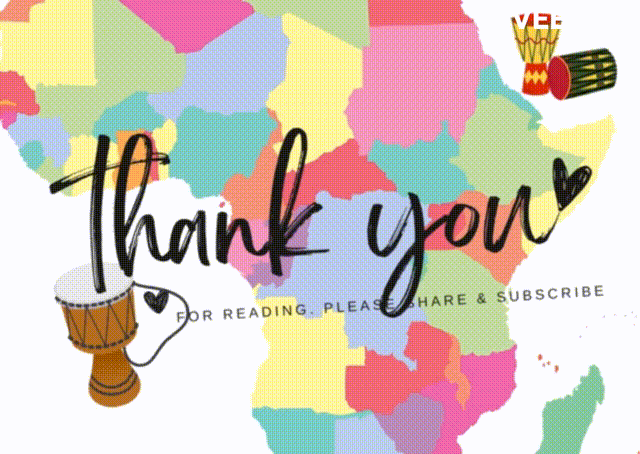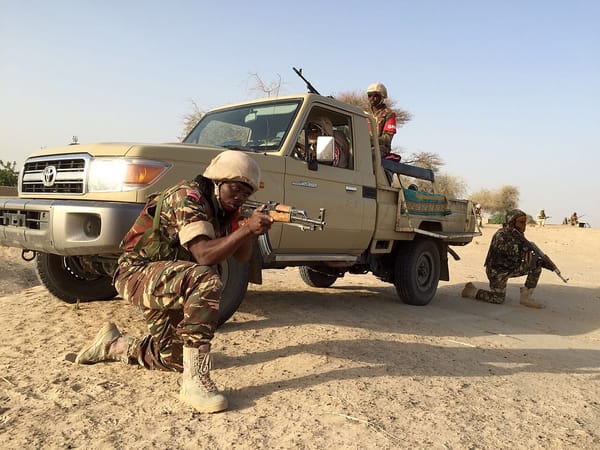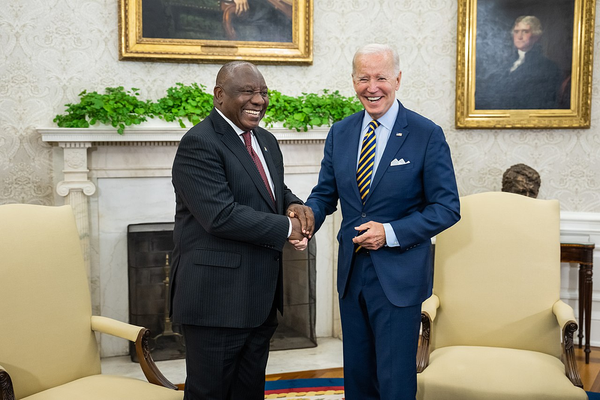News From Around The Motherland.
In this week's post, we look at the latest news about the planned protest in Nigeria, and the ongoing tensions between Egypt and Ethiopia. We also examine the lingering Sudanese war and the continuing conflict in the D.R. Congo.

Hi there! Here are the top African news making headlines from week 38 of the year 2024
- Planned Independence Day Protest To Go Ahead Despite Heightened Police Presence Across Nigeria.
- Egypt Supplies Arms To Somalia Amid Tensions With Ethiopia.
- Russia To Supply Telecom And Surveillance Satelite To The Sahel States.
- Sudanese Army Lunches Major Offensive Against The RSF Despite Untold Human Suffering And Destruction.
- Russian President Threatens Use Of Nuclear Nuclear Weapon.
HEADLINE NEWS.
Nigeria.
Planned Independence Day Protest To Go Ahead Despite Heightened Police Presence Across Nigeria.

The October 1 protest planned by Nigerian activists is gaining national and international attention as it highlights the growing public dissatisfaction with President Bola Tinubu's economic policies. The demonstration, organized under the banner of #FearlessOctober1, follows a similar protest in August and is driven by concerns over rising fuel prices, inflation, insecurity, and government inefficiency. Despite warnings from authorities, protest leaders, including Omoyele Sowore, insist the protest will go ahead, calling for electoral reforms, improved governance, and urgent economic relief. Police forces across the country, including in key states like Lagos, Abuja, and Kano, have heightened security measures to prevent violence, mindful of past protests that have escalated into unrest. Internationally, the protest reflects the broader struggle in many African countries where rising costs of living and economic instability have led to social unrest. Observers fear the protest could affect Nigeria’s international standing, especially as it is planned for Nigeria's Independence Day—a symbolically significant moment.
Nigeria.
Nigeria Secures A $1.57 Billion Financing Package From The World Bank.

The World Bank has approved a $1.57 billion financing package for Nigeria aimed at improving its health, education, and power sectors. As Nigeria's largest lender, with over $15 billion in loans as of March, the bank's support is significant. The package includes $500 million to address governance challenges impacting education and healthcare delivery, $570 million for strengthening primary healthcare services, and $500 million for sustainable power and irrigation projects. This support is critical for a country where insecurity, particularly in the north, has led to one of the highest rates of out-of-school children.
Additionally, the financing will contribute to improving dam safety in response to Nigeria's recurrent flooding issues, which have displaced millions. The urgency of this intervention is heightened by recent flooding in Borno State, where a dam collapse affected nearly a million people. With water being released from a large Cameroonian dam to prevent overflow, further flooding is anticipated, underscoring the need for improved infrastructure and disaster preparedness. The World Bank’s package is positioned to address these pressing challenges while enhancing long-term resilience in Nigeria.
Egypt.
Egypt Supplies Arms To Somalia Amid Tensions With Ethiopia.

During a news conference with visiting Somali President Hassan Sheikh Mohamud, Cairo expressed its commitment to strengthening ties with Somalia and supporting regional stability. The visit highlighted cooperation between Egypt and Somalia in various sectors, including security and development. This is coming amid tensions between Egypt and Ethiopia over Ethiopia's mega-dam over the Nile.
In addition, the African Union revealed in July that Egypt had offered to contribute soldiers to a new peacekeeping mission in Somalia. However, Egypt has yet to comment publicly on this potential deployment. The peacekeeping mission aims to stabilize Somalia as it continues to face security challenges from insurgent groups.
Tanzania.
Opposition Party Leaders Planning Anti-Government Protest Arrested.

Tanzania's main opposition party, Chadema, faced a police crackdown on Monday as leaders, including chairman Freeman Mbowe and deputy chairman Tundu Lissu, were arrested in Dar-es-Salaam. The arrests occurred ahead of a planned protest against alleged killings and abductions of government critics. Chadema accuses President Samia Suluhu Hassan's government of using repressive tactics, similar to those under former President John Magufuli. Despite police warnings, the party insisted the protest would be peaceful. Rights groups and Western governments have condemned the arrests, calling them undemocratic, as tensions rise ahead of upcoming elections.
The Sahel.
Russia To Supply Telecom And Surveillance Satelite To The Sahel States.

Mali, Niger, and Burkina Faso have signed an agreement with Russia to acquire telecom and surveillance satellites, aiming to improve border surveillance, national security, and disaster response capabilities. The deal, discussed with Russia’s Roscosmos in Bamako, comes as the three Sahel countries, under military rule, continue to struggle with Islamist insurgencies.
The satellites will enhance secure communications and monitor emergencies such as floods and droughts. This partnership follows the formation of the Alliance of Sahel States, initially focused on military cooperation. Despite Russian military support, including weapons and mercenaries, the region's security remains precarious.
Sudan.
Sudanese Army Lunches Major Offensive Against The RSF Despite Untold Human Suffering And Destruction.

Sudan's army has launched a major offensive against the paramilitary Rapid Support Forces (RSF), targeting areas in Khartoum and Bahri to reclaim territory lost at the start of the civil war in April 2023. Despite US-led ceasefire talks, heavy artillery and airstrikes have intensified, marking the military’s first significant push in months. Sudan’s de facto leader, Gen Abdel Fattah al-Burhan, supports ending the war but insists it must include the removal of RSF forces from Sudanese territory, accusing neighbouring countries of funding the group for political gain.
The ongoing conflict has caused one of the world’s worst humanitarian crises, with an estimated 150,000 people killed and over 10 million displaced. The UN has called for immediate action, highlighting widespread hunger, displacement, and a growing cholera epidemic. The African Union remains paralyzed as the carnage continues. Both sides are accused of indiscriminately bombing civilian areas, and there are fears of genocide in Darfur. Aid efforts remain severely hampered by the ongoing violence, deepening the crisis.
The Sahel.
French Journalist Accused Of Jihadist Sentimental Analysis.

Prosecutors in Mali, Burkina Faso, and Niger have launched investigations against French journalist and researcher Wassim Nasr, accusing him of being an "apologist for terrorism." Nasr, known for his expertise on jihadist movements and his work for France 24, is facing charges of criminal conspiracy, complicity in acts of terrorism, and supporting terrorism. This follows his detailed analysis of recent jihadist attacks, including the September 17 assault on strategic sites in Mali's capital, Bamako. The joint statement from the three Sahel nations, now governed by military juntas, alleges that Nasr's commentary on jihadist activities amounts to support for terrorism.
Nasr, based in France, declined to comment directly on the accusations but expressed solidarity with journalists in the region who face repression. The Sahel region has seen an ongoing Islamist insurgency since 2012, and the juntas in these countries have distanced themselves from Western allies, aligning more closely with Russia and restricting international media coverage, including suspending France 24 over its reporting on the conflict.
Zimbabwe.
New Zimbabwean Currency Unsustainable Says U.S. Based Economist.

US-based economist Steve Hanke has stated that Zimbabwe’s inflation has soared to 880% per year, declaring the country’s economy is "up in flames." This follows the rapid depreciation of Zimbabwe's gold-backed currency, ZiG, which was introduced by the Reserve Bank of Zimbabwe (RBZ) in April to replace the failing RTGS and Bond Notes. Despite being backed by 2.5 tonnes of gold, the currency has tumbled, with the black market exchange rate now at ZWG30 to US$1, compared to the official rate of ZWG13.95. The RBZ has attempted to stabilize the currency by injecting US$64 million into the interbank market, but exchange rate mismanagement continues to wreak havoc. A recent World Bank and Confederation of Zimbabwe Industries (CZI) report revealed the country lost over US$3 billion between 2020 and 2023 due to poor exchange rate policies. As a result, major retailers are warning of potential closures due to mounting losses caused by the unstable currency.
The Democratic Republic Of Congo.
Indiscriminate Bombing Of Refugee Camps By Government And Rebel Forces In D.R. Congo.

A new Human Rights Watch report alleges that Rwandan forces and M23 rebels have repeatedly shelled refugee camps and populated areas in the Eastern Democratic Republic of the Congo (DRC) throughout 2024, potentially violating international human rights law. The DRC's army and allied militias were also accused of endangering displaced civilians by stationing artillery near the camps. The conflict in eastern DRC has displaced millions, with over half a million forced into camps near Goma, as the M23, with Rwandan support, has gained control over large areas of North Kivu.
Researchers documented five instances since January where Rwandan and M23 forces attacked displacement camps, including a May incident that killed 17 civilians, mostly children. The report further accuses both the DRC's army and M23 fighters of sexual violence and other abuses against civilians. The ongoing violence highlights the need for all parties to adhere to international humanitarian law and seek peaceful dialogue to resolve the conflict, according to experts.
WORLD HEADLINES.
Russian President Threatens Use Of Nuclear Nuclear Weapon.

Russian President Vladimir Putin has indicated that Russia may revise its nuclear doctrine to treat an attack by a non-nuclear state, supported by a nuclear-armed country, as a "joint attack" warranting a nuclear response. This statement, delivered after a Security Council meeting, signals a potential shift in Russia’s approach to nuclear weapons use, with Putin suggesting that even conventional missile strikes on Russia could be met with nuclear force if they pose a critical threat. His comments come as Ukraine, a non-nuclear state backed by Western nuclear powers, seeks to use long-range Western missiles against Russian military targets.
Putin’s remarks are seen as a response to Ukraine’s ongoing counteroffensive and its allies’ military aid. US officials, including Secretary of State Antony Blinken, condemned Putin's rhetoric as "irresponsible," while Ukrainian officials dismissed it as nuclear blackmail. Putin has previously threatened nuclear action, but these latest comments are viewed as a serious escalation in the context of the war in Ukraine. China, Russia’s key ally, has reportedly urged restraint, warning against the use of nuclear arms.
Israeli Airstrike Eliminates Hezbollah Leader.

Israeli airstrikes have reportedly eliminated Hezbollah leader Hassan Nasrallah in a precision operation targeting the group's underground command centre in Beirut. The attack, confirmed by the Israeli Defence Forces (IDF), also claimed the lives of several senior Hezbollah commanders. The strike, using GBU-72 bunker-busting bombs, is part of an ongoing Israeli campaign to dismantle Hezbollah’s infrastructure and leadership in Lebanon. The death of Nasrallah represents a significant blow to Hezbollah, further disrupting its command structure. The operation follows a series of strikes targeting the group's bunkers, stockpiles, and missile capabilities, severely weakening Hezbollah’s capacity to coordinate its operations and launch large-scale attacks. Israel’s military dominance, aided by advanced technology like F-35 jets, has been uncontested, diminishing Hezbollah’s defensive capabilities and marking a critical moment in the longstanding conflict between the two entities.
Hurricane Helene Wrecks Havoc Across American State.

Hurricane Helene has left at least 63 dead and millions without power as it tore through the southeastern US. North Carolina remains heavily impacted, with over 400 roads closed and the town of Asheville largely cut off, requiring airlifted supplies. The storm triggered dangerous flooding, prompting daring rescues across multiple states, including Tennessee, where 50 people were stranded on a hospital roof. Helene, the most powerful storm on record to hit Florida’s Big Bend, brought destructive winds and rains as it moved north through Georgia, Tennessee, and the Carolinas, causing widespread damage and fatalities.
Despite weakening, Helene's aftermath continues to pose risks, including the threat of tornadoes and landslides. Over three million homes and businesses remain without power, with ongoing recovery efforts supported by federal emergency personnel and National Guard troops. The storm surge along the Florida coast reached up to 15 feet, and flooding has displaced many families, including those who had to swim to safety. President Joe Biden has urged caution as the storm's full impact is not yet over, with more storms anticipated before the hurricane season officially ends in November.
African Personality Of The Week
Florence Otedola

Florence Otedola, popularly known as DJ Cuppy, became the first British Nigerian to host an opening session at the United Nations General Assembly (UNGA). Leading the "Summit of the Future – Youth Actions Day," she emphasized youth leadership and education, aligning with Sustainable Development Goal 4. DJ Cuppy hinted at future political ambitions, sparking excitement by suggesting she could one day become Nigeria’s first female president. Her closing musical performance electrified the audience.
In a memorable exchange, UN Deputy Secretary-General Amina Mohammed humorously responded to Cuppy’s presidential aspirations, underscoring the rise of female leadership. Beyond her entertainment career, Cuppy’s academic achievements are impressive, with degrees from King’s College, and Oxford University, and currently pursuing her fourth degree at the London School of Economics.
We invite you to explore sponsorship opportunities or get in touch with us. Reaching out to admin@prominentgreen.com.
Your engagement is highly valued, and we look forward to hearing from you with enthusiasm!

Thank you for reading.
Unlock a world of knowledge and stay ahead of the curve by subscribing to our engaging weekly newsletter.
If this was forwarded to you, don't miss out on the latest and most important headlines in Africa. Subscribe now, share your thoughts in the comments, and spread the knowledge




